Reflective Report: Alternative Economic Visions from Ukrainian Culture
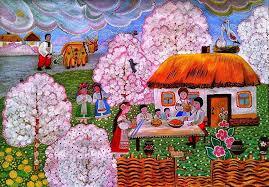
Introduction
Monetary design integrates cultural narratives and aesthetic codes, transforming banknotes into carriers of both value and heritage. If culture is embedded in money, why is it so often excluded from economic theory?
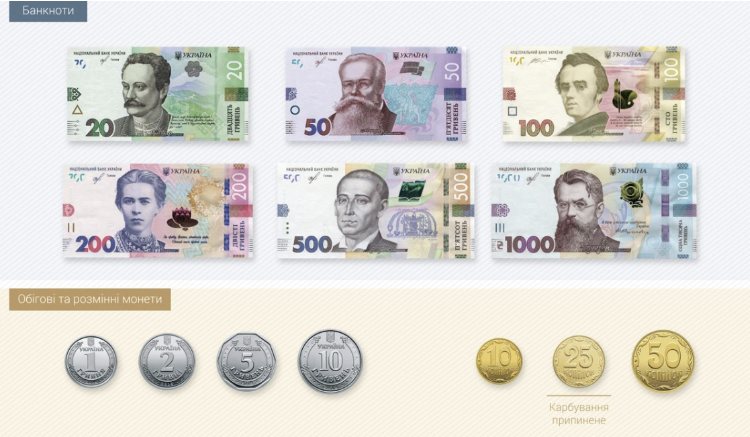
Ukrainian hryvna banknotes and coins
(National Bank of Ukraine, 2019)
I am an undergraduate Economics student and in collaboration with my supervisor Dr. Alice Damiano, from the Faculty of Environment, we combined distinct academic perspectives to embrace inclusivity in economics through our research “Alternative Economic Visions from Ukrainian Culture”. Our research project aims to identify aspects and behaviours from Ukrainian culture that challenge mainstream economic visions and aim for better social and environmental outcomes. In the context of research, it is essential to mention that I am a Ukrainian refugee, who lived in Ukraine most of my life, until the start of the Russian full-scale invasion to Ukraine in 2022.
I have conducted 12 online interviews with Ukrainians who work in cultural fields (for example, art, music, book publishing, food) to collect qualitative data and analyse it. Selected participants came from Kharkiv (urban and rural areas) to ensure the most similar cultural background. Most of them are currently operating in Kharkiv, but some migrated due to the war to Kyiv or abroad. Using both English and Ukrainian sources we have identified limited information and gaps on the topic. Therefore, our research was exploratory with no initial hypothesis to test. Interview questions were formulated open and wide on purpose to allow participants to freely express their thoughts and encourage reflection.
This report outlines the significance of the project, the challenges I faced, broader insights, dissemination activities I am going to undertake, the lessons and reflections that shaped my learning journey and future aspirations. The further sections are
- Importance of the research generally and personally
- Different direction of thoughts
- Inspiring business which prioritises culture
- War as a factor
- Challenges in translation
- Research findings
- Shaping my future
- Conclusion
- Special mentions
Importance of the research generally and personally
“Alternative Economic Visions from Ukrainian Culture” combined key parts of me in the best possible way. I would like to influence the perception of Ukraine and Ukrainian people. I am often asked questions related to the war, when a new person finds out that I am from Ukraine. I appreciate the interest and I got used to answering difficult questions. The concentration on topics around war, foreign propaganda, refugees is noticeable not only in news but also research papers related to Ukraine. Those topics are important, but attention should also be directed toward understanding who Ukrainians themselves and deeper reasons of their resistance are. This research shows some more context of Ukrainians and promotes Ukrainian visibility on the international stage. At the same time, making this research related to Ukraine should additionally remind the audience to remember about ongoing people’s sufferings during wartime, which must be stopped. Increasing the understanding of Ukrainians as a people may indirectly contribute to attracting more help.
Another aspect is that economics is perceived to be just about money and complicated mathematical models by public. These beliefs are right to some extent, as mainstream approaches seem to be largely mathematical. The main criticism is that economic models may not reflect people’s behaviours in real life and made assumptions do not consider sustainability of priorities. In the words of interviewee “The economy is not a figurative reflection of values”. By conducting this research, we are sparking more discussions and are contributing to the focus shift of mainstream economics to key elements of sustainable social welfare. Our project promotes inclusivity by embracing pluralistic ideas and intercultural dialogue.
Different direction of thoughts
At the start of the project, we had to decide in more detail about research design and more specific research questions. At first, my thought processes for generating focus ideas were based on defining mainstream economic visions. Within this research, they mostly include Neoclassical economics theories and those, which are taught in the core modules of my Economics course. As a next step, I brainstormed what behaviours would not be explained with such theories connecting this to my memories of Ukrainians who also behaved against economic conventions. That’s how ideas about volunteering, donating money, boycotting products and activism originated. During our initial meeting, my supervisor suggested also a different approach which firstly comes from considerations on what is Ukrainian Culture, then how it may be connected to e.g. values, which economic theory does not consider. And I have attempted to use this strategy too. Both tactics served their purpose well for literature review and developing questions. I presume our differences in perception were driven from a different academic background. Comfortability to express opinions and open mindedness made a positive difference.
Inspiring business, which prioritises culture
After the details of the research design were discussed and decided, ethical approval was in process. While waiting, I was completing an internship at Think City company in Malaysia, as a part of Global Futures Programme from Common Purpose in partnership with my university. At first glance, this activity is not related to Laidlaw. However, since I have started this research, I noticed some concepts relevant to our research behind the Think City’s projects. Think City is urban consultancy, which prioritises culture behind their projects, through deep community engagement. Their main project was reconstruction of an historical centre, which also used to be a main business centre in Kuala Lumpur. They were using culture to influence the economy of the area, as their strategy involved building on existing culture and adding elements which would encourage business activities. In other words, “celebrating the past, while nurturing the future”. I was curious about their perceptions behind their work, and our research made it easier to formulate and ask questions. I had a chance to share my thoughts and contribute to their work. The Think City example inspired me even more. I wish more businesses would consider culture when making decisions, by recognising unique aspects like people’s behaviours, values, and everyday activities, and understanding how companies and the economy influence them. In Ukraine especially, I hope the question of how places will be rebuilt, redesigned, and reimagined will become part of the national agenda and be approached in a sustainable way.
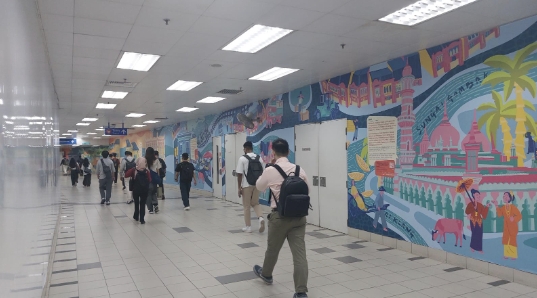
Mural, one of the Think City’s interventions to LRT station,
Kuala Lumpur
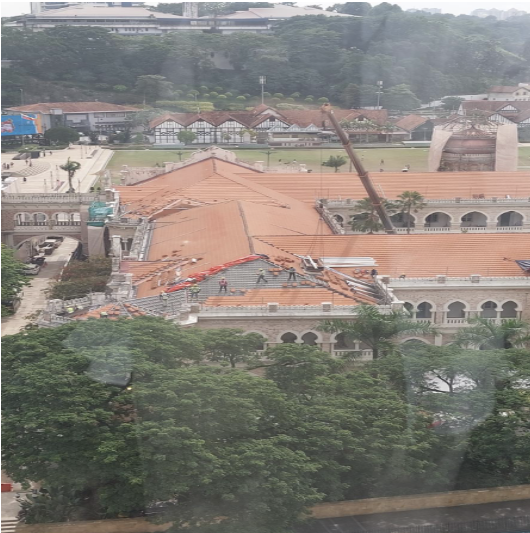
Think City’s reconstruction of Sultan Abdul Samad Building,
Kuala Lumpur
Since Laidlaw became part of who I am, it influences how I act as a leader in many situations. That’s why I see these experiences as indirectly connected to Laidlaw. This logic translates into the research, as thoughts on research were on the back of my mind, I explored questions within my environment outside of research processes. I have developed a habit of uncovering insights in places I never thought to look.
War as a factor
We have agreed not to focus on the war, but to recognise it as a factor. And how often war is mentioned as a factor and how it affected (or not) behaviours depended on participants’ responses during interviews. We made sure that our interview questions do not encourage sharing traumatic experiences and in consent form we made it clear that participants should share only what they are comfortable with sharing. As a result, I have heard about the war as a context, not direct topic. I am not sure to what extent such context is visible for people who have never experienced that. For example, when some participants were referring to the war as “it” or saying, “you know how it is in our country”, “since 22”. This context is reflected in more than that. One of the questions I asked participants was “What do you think are the main values and visions in Ukrainian culture?”, one of the popular values to mention was “Freedom”. Everyone would have different associations with “freedom”, different definitions. And for Ukrainians, this word has a special meaning and importance. The explanation likely requires no further elaboration. I was already aware prior to Laidlaw that my background gives me more unique perceptions. However, I have discovered the ability to notice context during the research. We all interpret situations through different lenses, yet we rarely pause to consider that some elements may go unnoticed by others. With contexts like war, it may be difficult to communicate those details and due to the traumatic nature, the urge to express it is often missing.
I have stated in the “Importance of the research” my desire to expand public’s associations with Ukraine. Upon closer reflection, I did not initially realise that to some extent I wanted to get to know Ukrainian culture deeper myself. In particular, to hear more from people from homeland, most of whom are currently living in dangerous circumstances. As a person geographically distanced from war, I managed to be closer to those incredible people as much as it was possible for me. I appreciated the opportunity to engage with literature in Ukrainian, despite a much lower availability of resources, and to talk in Ukrainian to Ukrainians, who were open to reflection and deep questions. In day-to-day life my main interactions with Ukraine are watching news. I should deepen my knowledge by exploring Ukrainian sources aligned with my interests and engaging more with general content in Ukrainian. This would allow me to sustain a meaningful connection to my cultural heritage and deepen my sense of identity. It also enables me to engage with diverse perspectives beyond my immediate environment, made possible through my knowledge of Ukrainian language.
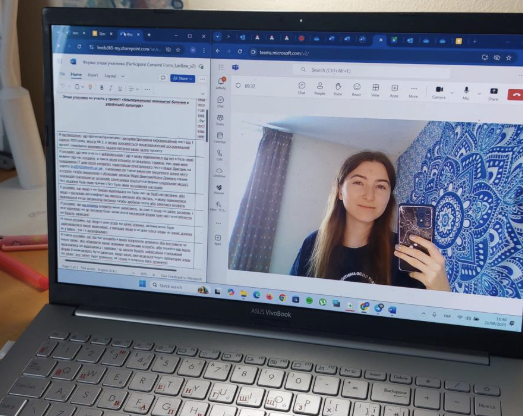
Online interviews
Challenges in translation
When I was learning English, it was typical to have a writing task of translating sentences from English to Ukrainian. During processing of interviews, my task was the opposite with the use of autotranslation. The challenge I faced was that even though automatic transcription during interviews was mostly recording participants' train of thoughts correctly, automatic translation couldn't reflect the content accurately. I have noticed that meanings are generally confused, because
1) Participants tent to say long sentences, without a clear beginning or end;
2) Participants use untranslatable (or non-representatively translatable) filler words, which are influencing the meaning of translation or slang;
3) Ukrainian sentence structure is different. Automatic translation attempts to translate word-by-word, but the right way to translate would be to take a sentence as whole and translate the meaning rather than the words.
My supervisor reminded me that to minimise these issues, I should make the original document as clear as possible. This involved making sure that sentences are separated, filler words are deleted and edit the automatic translation when the meaning is getting lost anyway. Partially I managed to solve the main problems. However, the way I felt when I had the conversation with people and read original transcription and the way I see translated text is different. One of the participants mentioned "When you talk about Ukraine, not in Ukrainian, it is different". Every language has unique aspects, and it is a part of culture. There are many ways to translate the same idea, and none of them would feel fully the same.
I had to accept that it is not feasible to adapt and rewrite every automatically translated sentence to attempt to transfer an expressive quality as close to original as possible. Understanding limitations, putting the sense of perfection aside and recognising when it is not needed to invest time in are essential for successful results.
Research findings
Preliminary results suggest that in decision making a greater importance is given to values than to economic motives. Our work proposes alternative views in the field of economics and contributes to the integration in the economic field of intercultural perspectives coming from Ukrainian culture, contributing to the valorisation of this culture. We found that some behaviours are related to the mindset, influenced by cultural environment, shaped by history, rather than being explained by financial factors. For instance, people consider their culture-specific values and meanings when they create a product and choose a product. Also, some interviewees stressed the importance of allocating more resources to the promotion of culture and ethical values.
The next steps for this project are the completion of the data analysis, publishing our findings and presenting them at conferences to spread awareness and ensure higher impact.
Shaping my future
Looking ahead, I aim to build on my Laidlaw and other experiences to contribute somewhere meaningfully. This research helped me to see that my ideal job in the future would be related to different key parts of my personality, as developing knowledge in my interests is what made this experience so enjoyable.
When responsible for making decisions, I intend to base them on personal and societal values rather than being driven solely by potential financial gain. This is the approach I observed in our participants. Many of them felt what is right to do, followed their passion, worked both for themselves and society. In my view, prioritising profit over principles may lead to greater long-term costs, not necessarily in monetary terms.
Lastly, as simple and obvious, as it may sound, a stable work schedule is a useful thing to have as a habit. When I managed to go to sleep and wake up at a certain time, it made a difference to my productivity. During my university 1st year term time, it was not possible for me to develop such habit, however, I hope to leave “freestyle sleep schedule” in the past and stick to a schedule from now on.
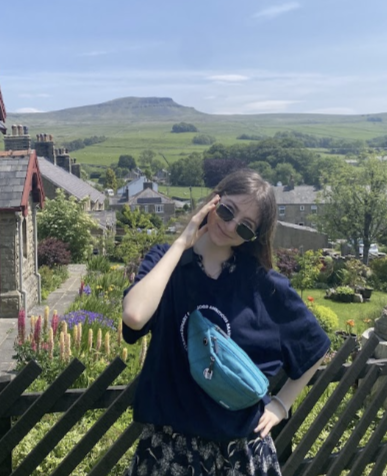
Laidlaw Residential 2 in Yorkshire Dales
(when my Laidlaw story began, but its path keeps evolving)
Conclusion
Our research hold a great importance and I hope that at some point in the future it would not be relevant to refer to our presented visions as “alternative”, as they would become a part of mainstream.
Highlighting a one single lesson I have learned with my research is beyond my ability, because there were too many of them, which naturally merged in my mind and changed myself as a leader. Outlined highlights were on considerations I returned to the most during the process.
I have developed leadership through enriching teamwork skills when working with my supervisor, decision-making when designing a research, integrity when following ethics procedures, curiosity when asking questions, time-management skills when planning, communication when inviting participants and interviewing them, vision when spreading our findings.
Special mentions
I appreciate all the people who volunteered their time to take part in our interviews and those who expressed some interest in it. This demonstrates that Ukrainians found our topics meaningful and see their importance.
On the first meeting my supervisor, Dr. Alice Damiano, told me that we are a team, and we should work as a team. Personally, I have felt this level of support through the entire time of research. I am incredibly grateful for productive meetings, discussions, decision-making together, well-detailed emails, the help with every step of the process, patience and understanding. Grazie mille! Щиро дякую!
Each conclusion contains the seed of a new beginning.
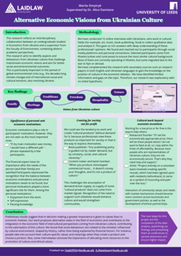

Please sign in
If you are a registered user on Laidlaw Scholars Network, please sign in